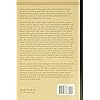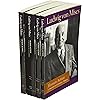





Buy Now, Pay Later
- – 4-month term
- – No impact on credit
- – Instant approval decision
- – Secure and straightforward checkout
Ready to go? Add this product to your cart and select a plan during checkout.
Payment plans are offered through our trusted finance partners Klarna, Affirm, Afterpay, Apple Pay, and PayTomorrow. No-credit-needed leasing options through Acima may also be available at checkout.
Learn more about financing & leasing here.
FREE 30-day refund/replacement
To qualify for a full refund, items must be returned in their original, unused condition. If an item is returned in a used, damaged, or materially different state, you may be granted a partial refund.
To initiate a return, please visit our Returns Center.
View our full returns policy here.
Recently Viewed
Description
In Human Action, Mises starts from the ideas set forth in his Theory and History that all actions and decisions are based on human needs, wants, and desires and continues deeper and further to explain how studying this human action is not only a legitimate science (praxeology) but how that science is based on the foundation of free-market economics.Mises presents and discusses all existing economic theories and then proceeds to explain how the only sensible, realistic, and feasible theory of economics is one based on how the needs and desires of human beings dictate trends, affect profits and losses, adjust supply and demand, set prices, and otherwise maintain, regulate, and control economic forces.Ludwig von Mises (1881–1973) was the leading spokesman of the Austrian School of economics throughout most of the twentieth century.Bettina Bien Greaves is a former resident scholar and trustee of the Foundation for Economic Education and was a senior staff member at FEE from 1951 to 1999. Read more
Publisher : Liberty Fund
Publication date : March 14, 2007
Edition : Later Printing
Language : English
Print length : 1128 pages
ISBN-10 : 0865976317
ISBN-13 : 13
Item Weight : 5 pounds
Dimensions : 6.1 x 3 x 9.1 inches
Part of series : Liberty Fund Library of the Works of Ludwig von Mises
Frequently asked questions
To initiate a return, please visit our Returns Center.
View our full returns policy here.
- Klarna Financing
- Affirm Pay in 4
- Affirm Financing
- Afterpay Financing
- PayTomorrow Financing
- Financing through Apple Pay
Learn more about financing & leasing here.
























